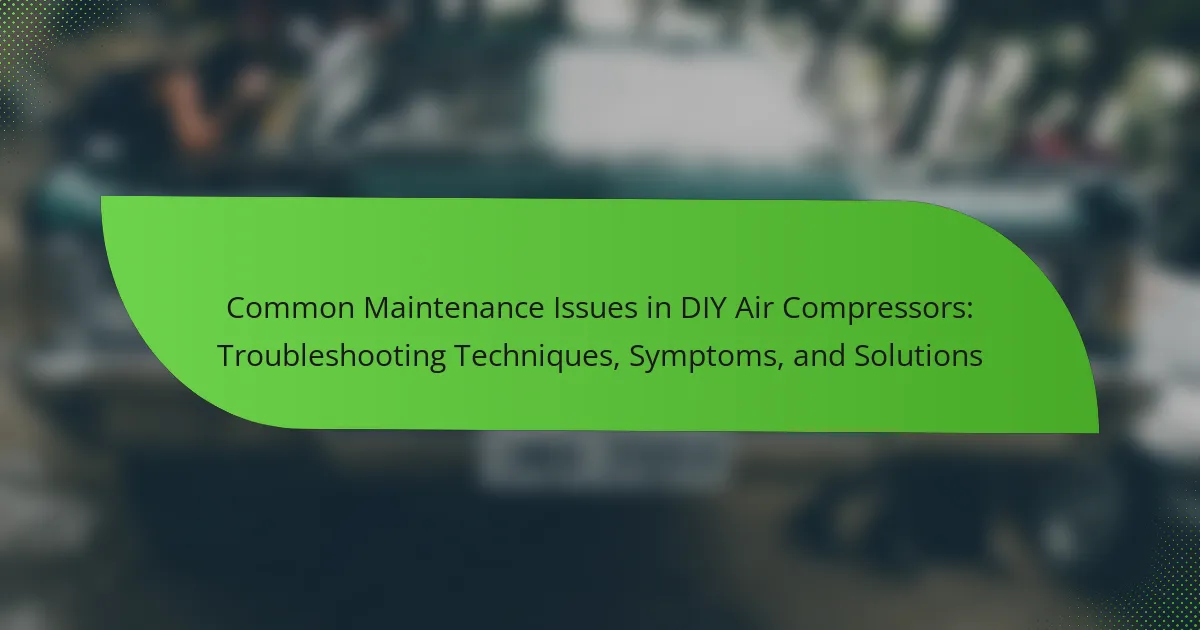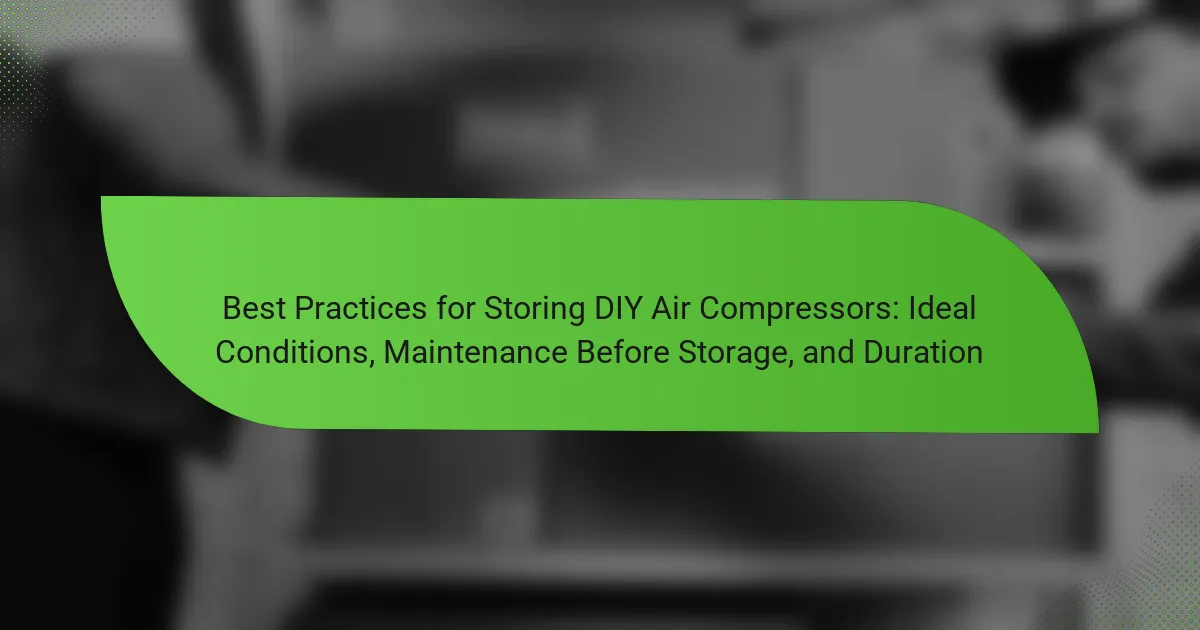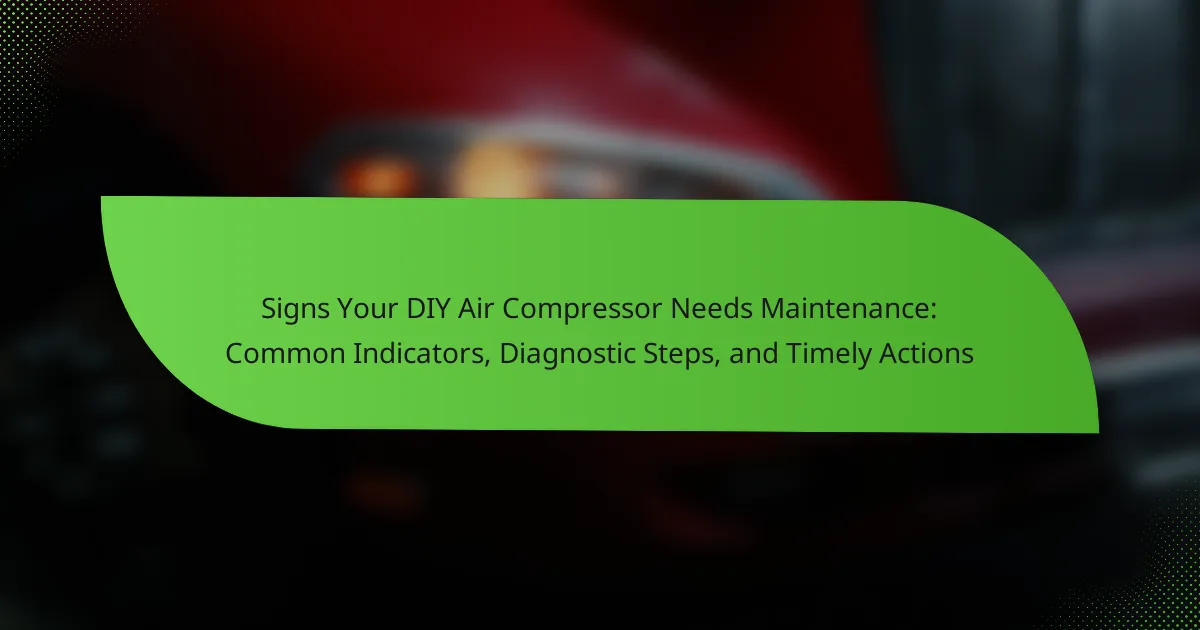Humidity significantly impacts DIY air compressor maintenance by causing moisture accumulation in the air tank, leading to rust and corrosion of internal components. This deterioration can reduce the performance and lifespan of the compressor, as well as damage pneumatic tools due to the mixing of water with compressed air. Effective prevention strategies include regular draining of the air tank, using desiccants or moisture separators, and implementing dehumidifiers and proper ventilation. Additionally, sealing leaks and maintaining consistent indoor temperatures are crucial for controlling humidity levels, ultimately enhancing the durability and functionality of air compressors. Regular maintenance practices are essential to mitigate the adverse effects of humidity.
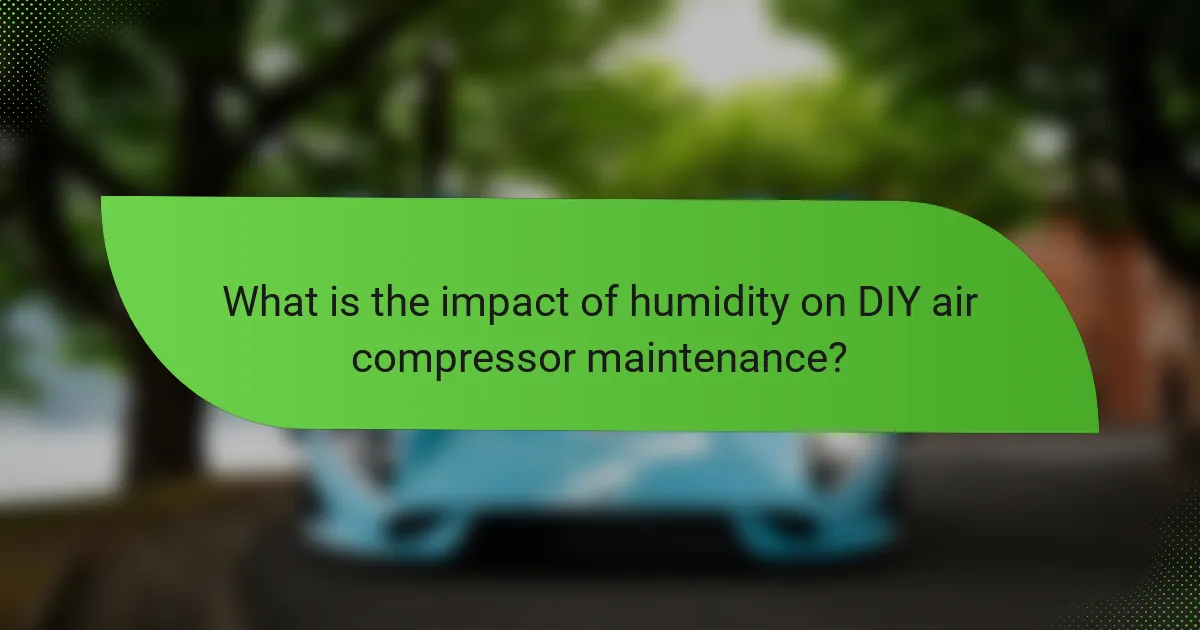
What is the impact of humidity on DIY air compressor maintenance?
Humidity negatively impacts DIY air compressor maintenance. High humidity levels can lead to moisture accumulation in the compressor’s air tank. This moisture promotes rust and corrosion on internal components. Rust can degrade the compressor’s performance and lifespan. Additionally, humidity can cause water to mix with the compressed air. This mixture can damage pneumatic tools and affect their efficiency. Regular draining of the air tank is essential to prevent moisture buildup. Using a desiccant or moisture separator can also mitigate humidity effects. Proper maintenance practices can enhance the compressor’s durability and functionality.
How does humidity affect the performance of air compressors?
Humidity negatively impacts the performance of air compressors. High humidity levels can lead to moisture accumulation in the compressed air. This moisture can cause corrosion in the compressor and downstream equipment. Additionally, it can affect the quality of the air being delivered. The presence of water vapor can lead to condensation in air lines. This condensation can cause blockages and reduced efficiency. Furthermore, moisture can damage pneumatic tools and affect their operation. Studies show that air compressors operate best in low humidity environments.
What specific issues arise from high humidity levels?
High humidity levels can lead to several specific issues. One major problem is corrosion of metal components. Moisture in the air accelerates rust formation on tools and equipment. Another issue is reduced efficiency of air compressors. High humidity can cause condensation in the air tank, leading to water accumulation. This water can damage internal components and affect performance. Additionally, high humidity may promote mold and mildew growth. These can contaminate air quality and damage stored materials. Lastly, high humidity can lead to increased wear on seals and gaskets. This results in more frequent maintenance needs and potential breakdowns.
How can low humidity levels impact air compressor functionality?
Low humidity levels can negatively impact air compressor functionality by causing increased risk of overheating. Air compressors rely on moisture in the air for cooling. When humidity is low, the air becomes drier, leading to less effective cooling. This can result in the compressor running hotter than normal. Overheating can lead to premature wear on internal components. Additionally, low humidity can cause static electricity buildup. This may lead to potential electrical issues within the compressor. Proper maintenance and monitoring of humidity levels are essential for optimal performance.
Why is understanding humidity important for air compressor maintenance?
Understanding humidity is crucial for air compressor maintenance because it affects performance and longevity. High humidity levels can lead to moisture accumulation in the compressor system. This moisture can cause corrosion and rust in internal components. Additionally, it can lead to water contamination in the compressed air, affecting tools and processes. Proper humidity management helps maintain optimal air quality and efficiency. According to industry standards, keeping humidity levels below 50% can reduce these risks significantly. Regular monitoring and maintenance can prevent costly repairs and downtime.
What are the long-term effects of neglecting humidity considerations?
Neglecting humidity considerations can lead to significant long-term damage in air compressor systems. High humidity levels can cause corrosion of metal components. This corrosion can weaken parts and lead to premature failure. Additionally, excess moisture can create a breeding ground for mold and bacteria. These contaminants can affect air quality and system performance. Furthermore, moisture in the air compressor can result in water accumulation in the tank. This water can cause rust and damage internal components. Over time, these issues can lead to costly repairs and reduced efficiency. Regular maintenance and humidity control are essential for longevity.
How does humidity influence the lifespan of air compressors?
Humidity negatively influences the lifespan of air compressors. High humidity levels can lead to condensation inside the compressor. This moisture can cause rust and corrosion on internal components. Corrosion can degrade essential parts, leading to mechanical failure. Additionally, moisture can contaminate the air supply, affecting tools and applications. A study by the American Society of Mechanical Engineers highlights that moisture-related damage is a common issue in humid environments. Proper maintenance, including regular draining of moisture, can mitigate these effects. Therefore, humidity control is crucial for prolonging the lifespan of air compressors.
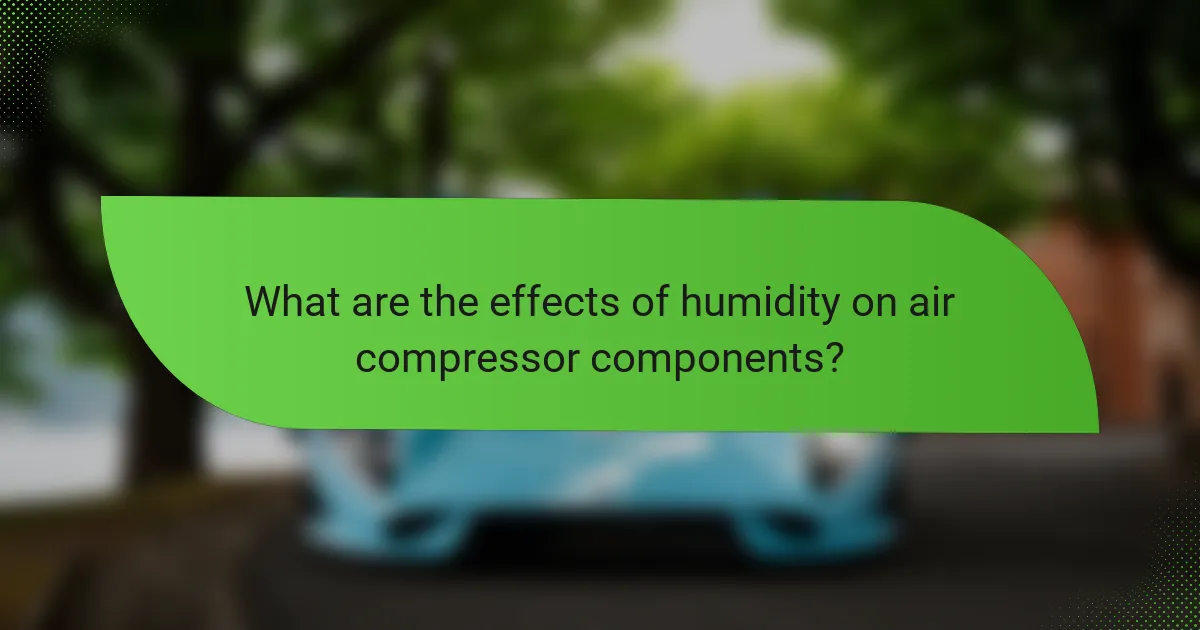
What are the effects of humidity on air compressor components?
Humidity negatively affects air compressor components by promoting corrosion and rust. High moisture levels can lead to water accumulation in the air tank. This water can corrode metal parts, such as valves and pistons, reducing their lifespan. Rust can also clog filters and reduce efficiency. Additionally, humidity can cause moisture to mix with lubricants, degrading their effectiveness. This can lead to increased friction and wear on moving parts. Regular maintenance is essential to mitigate these effects. Draining the air tank and using moisture separators can help reduce humidity-related damage.
How does humidity contribute to corrosion in air compressors?
Humidity contributes to corrosion in air compressors by increasing the moisture content in the air. This moisture can condense on metal surfaces within the compressor. The presence of water creates an electrochemical reaction that accelerates the oxidation of metal parts. As a result, rust and corrosion form more rapidly. High humidity levels can lead to significant deterioration of components over time. Studies show that corrosion can reduce the lifespan of air compressors by up to 50%. Regular maintenance and moisture control are essential to mitigate these effects.
What components are most susceptible to humidity-related damage?
Components most susceptible to humidity-related damage include electrical circuits, metal parts, and rubber seals. Electrical circuits can corrode when exposed to moisture. Metal parts, such as compressors and fittings, may rust or oxidize due to humidity. Rubber seals can degrade and lose their elasticity when subjected to high moisture levels. These effects can lead to reduced performance and increased maintenance needs. Proper storage and maintenance practices can mitigate these risks.
How can corrosion affect compressor efficiency?
Corrosion can significantly reduce compressor efficiency by causing physical damage to internal components. This damage leads to increased friction and wear, which hampers the compressor’s ability to operate smoothly. Corroded parts may not seal properly, resulting in air leaks and reduced pressure output. Furthermore, corrosion can lead to the accumulation of debris and contaminants in the compressor, further impairing its function. Studies have shown that even minor corrosion can lead to efficiency losses of up to 10-20% over time. Regular maintenance and monitoring are essential to prevent corrosion and maintain optimal compressor performance.
What role does humidity play in air quality produced by compressors?
Humidity significantly impacts the air quality produced by compressors. High humidity levels can lead to moisture accumulation in the compressed air. This moisture can cause corrosion in the compressor and downstream equipment. Additionally, water in the air can lead to the growth of mold and bacteria. These contaminants can degrade air quality and affect the performance of pneumatic tools. Maintaining optimal humidity levels helps ensure cleaner, drier air. This, in turn, enhances the longevity of the equipment and improves air quality. Proper filtration and drying systems can mitigate humidity’s negative effects on compressed air.
How does moisture in compressed air affect tools and equipment?
Moisture in compressed air can lead to significant damage to tools and equipment. It can cause corrosion in metal components, leading to reduced lifespan and functionality. Moisture can also result in the formation of rust, which can obstruct moving parts. Additionally, it can lead to the accumulation of sludge in air lines and filters. This sludge can block airflow and reduce efficiency. Furthermore, moisture can affect the performance of pneumatic tools, causing erratic operation. Studies indicate that moisture can decrease the efficiency of air-operated systems by up to 30%. Therefore, managing moisture levels is critical for maintaining the integrity of tools and equipment.
What are the potential health risks associated with humid air from compressors?
Humid air from compressors can pose several health risks. One significant risk is the growth of mold and mildew. These fungi thrive in moist environments and can lead to respiratory issues. Exposure to mold spores can cause allergic reactions and asthma attacks.
Another risk is the increase of dust mites. Dust mites flourish in humid conditions, which can exacerbate allergies and respiratory problems. Additionally, humid air can lead to an increase in bacteria levels. Certain bacteria can cause infections or worsen existing health conditions.
Inadequate ventilation combined with humid air can also contribute to discomfort and heat stress. This can lead to fatigue and impaired cognitive function. Overall, maintaining low humidity levels is crucial for health and safety when using compressors.

What prevention strategies can be implemented for humidity control?
To control humidity effectively, several prevention strategies can be implemented. First, using dehumidifiers can significantly reduce moisture levels in the air. These devices work by extracting humidity, maintaining optimal levels. Second, proper ventilation is crucial. Ensuring adequate airflow helps to disperse moisture-laden air. Third, sealing leaks and gaps in windows and doors prevents humid air from entering. Fourth, using moisture-absorbing materials, like silica gel or activated charcoal, can help in smaller spaces. Additionally, maintaining consistent indoor temperatures reduces humidity fluctuations. Lastly, regular maintenance of HVAC systems ensures efficient humidity control. Studies show that these strategies can lower indoor humidity levels by up to 50%.
How can DIY enthusiasts effectively reduce humidity levels?
DIY enthusiasts can effectively reduce humidity levels by using dehumidifiers and improving ventilation. Dehumidifiers extract moisture from the air, significantly lowering humidity. Proper ventilation allows humid air to escape and fresh air to enter. Fans can enhance air circulation, further reducing moisture buildup. Sealing leaks in windows and doors prevents external humid air from entering. Using moisture-absorbing materials, such as silica gel or activated charcoal, can also help. Regularly monitoring humidity levels with a hygrometer ensures effective management. These methods are proven to maintain optimal humidity levels for DIY projects.
What tools and equipment are recommended for humidity control?
Dehumidifiers and hygrometers are recommended tools for humidity control. Dehumidifiers reduce moisture levels in the air. They help prevent corrosion and damage to air compressors. Hygrometers measure humidity levels accurately. Monitoring humidity is essential for maintaining optimal air compressor performance. Ventilation systems also assist in managing humidity. Proper airflow can help reduce moisture accumulation. Additionally, air filters can trap moisture-laden air. Using these tools ensures a more stable environment for air compressors.
How can routine maintenance help mitigate humidity issues?
Routine maintenance can significantly help mitigate humidity issues in air compressors. Regularly checking and replacing filters prevents moisture buildup. Ensuring proper drainage of condensate from tanks reduces humidity levels. Additionally, inspecting seals and gaskets helps maintain airtight conditions. Lubricating moving parts minimizes friction and heat, which can lead to condensation. Monitoring ambient temperature and humidity levels allows for timely adjustments. Using desiccant dryers or filters further controls moisture in the air supply. These practices collectively enhance the performance and longevity of air compressors.
What are the best practices for maintaining air compressors in humid environments?
To maintain air compressors in humid environments, implement regular drainage of condensate. This prevents moisture buildup in the tank. Inspect and replace air filters frequently to ensure optimal airflow. Use a desiccant dryer to reduce moisture content in compressed air. Ensure that all connections and hoses are airtight to prevent leaks. Perform routine inspections for rust or corrosion on metal components. Apply anti-corrosion spray to vulnerable parts to enhance protection. Store the compressor in a climate-controlled area when not in use. Follow these practices to extend the lifespan and efficiency of air compressors in humid conditions.
How often should maintenance checks be performed in humid conditions?
Maintenance checks should be performed every month in humid conditions. High humidity can accelerate wear and corrosion in air compressors. Monthly checks help identify issues early. This frequency is recommended to maintain optimal performance. Regular inspections can prevent costly repairs. Additionally, it ensures safety and reliability in operation. Humidity can lead to moisture accumulation, affecting components. Therefore, consistent maintenance is crucial in these environments.
What specific maintenance tasks should be prioritized to combat humidity?
Prioritize the inspection and replacement of air filters to combat humidity. Clogged filters can trap moisture and decrease efficiency. Regularly checking and replacing these filters ensures proper airflow and reduces humidity levels.
Next, focus on draining the air compressor tank frequently. This task prevents moisture build-up that can lead to rust and corrosion. It is recommended to drain the tank after each use to maintain optimal performance.
Additionally, inspect and maintain the compressor’s seals and gaskets. Damaged seals can allow humid air to enter the system, increasing moisture levels. Regular checks and replacements of these components are essential for maintaining a dry environment.
Lastly, consider using a desiccant or moisture trap in the air line. These devices absorb moisture and help keep the air supply dry. Implementing this can significantly reduce humidity-related issues in the system.
What troubleshooting tips can help address humidity-related issues?
To address humidity-related issues, first, check the air compressor’s moisture separator. Ensure it is functioning properly to remove excess water. Next, inspect the air filters for clogs, as dirty filters can trap moisture. Additionally, use a desiccant dryer to absorb humidity in the air supply. Monitor the environment where the compressor operates; keep it in a dry, well-ventilated area. Regularly drain the compressor tank to prevent water accumulation. Lastly, consider using anti-corrosive spray on metal components to protect against rust caused by humidity. These steps help maintain optimal performance and extend the lifespan of the air compressor.
How can users identify humidity problems in their compressors?
Users can identify humidity problems in their compressors by monitoring for moisture accumulation and inspecting for rust. Excessive humidity often leads to water buildup in the compressor tank. Users should check the drain valve regularly for signs of water discharge. Condensation on the exterior of the compressor is another indicator of high humidity levels. Additionally, users can observe the air quality; if the air is damp or has a musty odor, it may point to humidity issues. Frequent clogging of filters can also suggest moisture presence. Maintaining a consistent temperature in the compressor environment helps mitigate humidity effects. Regular maintenance checks can prevent long-term damage caused by humidity.
What steps should be taken if humidity damage is suspected?
If humidity damage is suspected, first turn off the air compressor to prevent further damage. Next, inspect the compressor for visible signs of moisture or corrosion. Remove any moisture using a dry cloth or a vacuum with a hose attachment. Check and clean the air filters to ensure proper airflow. Inspect the hoses and connections for leaks or damage. Allow the compressor to dry completely before turning it back on. Regularly monitor humidity levels in the storage area to prevent future issues. According to the American Society of Heating, Refrigerating and Air-Conditioning Engineers, maintaining a humidity level below 50% can help protect equipment from moisture-related damage.
The main entity of the article is DIY air compressors and their maintenance. The article examines the negative impact of humidity on air compressor performance, highlighting issues such as moisture accumulation, corrosion, and reduced efficiency. It outlines specific problems caused by high humidity levels, including damage to internal components and air quality degradation. Additionally, the article provides prevention strategies and best practices for maintaining air compressors in humid environments, emphasizing the importance of regular maintenance, moisture control, and monitoring humidity levels to enhance the lifespan and functionality of the equipment.
